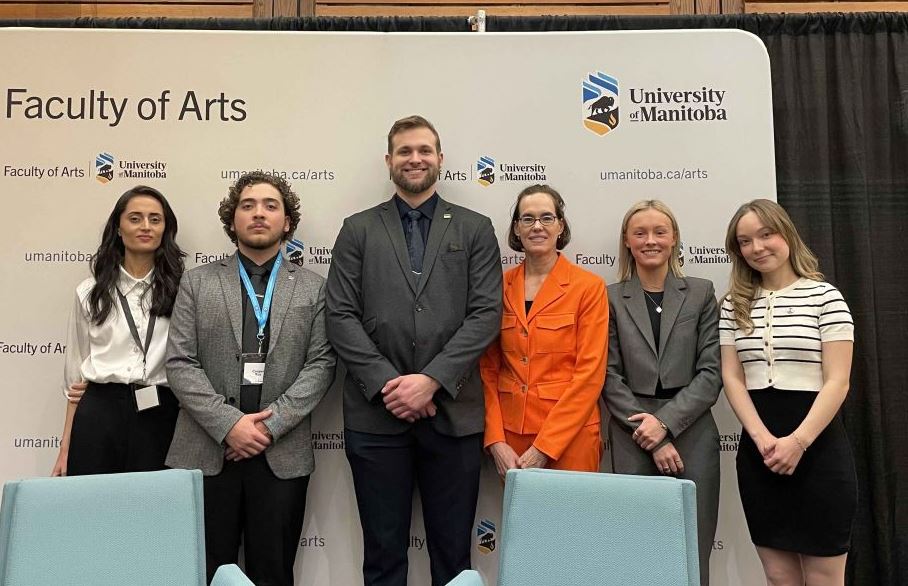
The 2025 PSSC organizing committee. Credit: S. Tiaglei
A Continuous Resilience in the Face of International Calamity
The 40th Annual PSSC Examines 80 Years of the United Nations
January 29-30, 2025 marked the 40th anniversary of the student-run and organized J.W. Dafoe Political Studies Students’ Conference (PSSC). This year’s theme was the United Nations (UN) at 80 – a topic of great scrutiny in the modern political climate. 2025 marks the 80th anniversary of the adoption of the United Nations Charter. While only 9000 words long, it sets the rules for the world. Today, the world is asking whether the Charter and the UN are fit for purpose. Wars, genocides and tyranny are as prevalent as ever, and while the UN has addressed some of these conflicts, others have been left untended.
The Honourable Bob Rae, Ambassador and Permanent Representative of Canada to the United Nations in New York and this year’s guest speaker at the Paul Buteux Memorial Lecture, opened the conference to an audience of over 400 at the Canadian Museum for Human Rights. He lamented the failure of the UN to recognize, address and prevent the terrors we see today. Ambassador Rae began his speech by quoting Blaise Pascal, who, 400 years ago, declared that justice without force is powerless, but force without justice is tyranny. This statement is as relevant today as it was then. Regardless of the UN’s struggles, the Ambassador invited the audience to recognize that the organization was not designed to solve every conflict and every injustice. Since its creation, we have seen gains in human rights around the world. There are no more empires, and we have developed vaccines. However, what was beginning to look like a rule of law 80 years ago, is again becoming a rule of force. Ambassador Rae is clear-eyed about the challenges the UN faces.
The second day of the conference, held at UM’s Fort Garry Campus, began with a panel entitled ‘UN Peacekeeping,’ featuring current and retired service members who participated in various UN missions. Both Canadian and Peruvian military shared their experiences in various UN-led operations and peacekeeping missions, including MINUSMA (Mali), UNMIS (Sudan), MINUSTAH (Haiti), and United Nations-African Union Mission in Darfur (UNAMID). Panellists spoke on the varying degrees of successes and failures of mission mandates and the reasoning behind them. The uniqueness of this panel came from a combination of factual and informative accounts paired with very personal stories about what happened on the ground during these missions.
The second panel, entitled ‘the UN of the Present and Future,’ showcased academics from UM speaking to issues of Indigenous participation and recognition at the UN, UN reform, and the UN’s complexities when addressing and prosecuting acts of genocide. From the obstacles created by the veto wielded by five states (the Permanent Members) to the failure to prevent and recognize acts of mass atrocities and aggression, the UN is far from perfect. But even with its imperfections, it is the only multilateral organization to effectively and legally create lasting change in the world. The Charter, therefore, should be viewed as a living instrument that can be interpreted contemporarily to deal with evolving international complexities. The day concluded with a keynote address from the Honourable Dr. Lloyd Axworthy, Canada’s Former Minister of Foreign Affairs. Dr. Axworthy underscored sentiments preached by Mr. Rae and the panellists about the importance of cooperation among states and Canada’s important role in creating a more peaceful world.
This year’s PSSC was attended by numerous local and international guests, including staff and students from UM, University of North Dakota, West Point Military Academy, multiple high schools as well as the general public. As a student-run conference, the PSSC enables a new generation of future political leaders, activists and academics to engage in essential topics of today’s ever-changing world. In addition to the invaluable insights attendees gain from speakers, one of the greatest learning opportunities that stem from events like these lies in their foundation. The process of organizing this conference enabled student volunteers to enhance various skills ranging from media, communications and detailed planning, to leadership, time management and, perhaps most importantly, teamwork. Such skills can be brought into students’ future workplace and volunteer opportunities. Overall, the conference provided a thoughtful exploration of how the UN has evolved, adapted, and prevailed despite events ranging from great power quarrels to civil wars and even genocide. The UN remains at the cornerstone of solving issues pertaining to international peace and security, fostering dialogue and providing aid. The UN advances dialogue between states that possess varying systems of governance, opposing religions and distinctive social and cultural views. Differences will always be a challenge, but finding common ground despite dissimilarities is the mandate of the UN. In a similar fashion, the PSSC attempts to do the same.
Listen to the 2025 Paul Buteux Memorial Lecture with Hon. Bob Rae on YouTube
Watch the 2025 PSSC keynote with Hon. Dr. Lloyd Axworthy on YouTube






